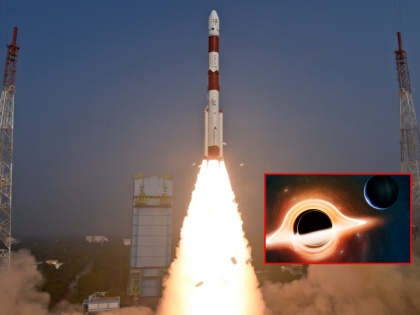ISRO Launches PSLV-C58 To Study Black hole All You Need To Know, And How it Benefits India
By Lokmat English Desk | Published: January 1, 2024 01:15 PM2024-01-01T13:15:59+5:302024-01-01T13:25:52+5:30
Exploring the cosmic mysteries of black holes, where gravity holds absolute sway, has fascinated humanity for ages. These enigmatic ...

ISRO Launches PSLV-C58 To Study Black hole All You Need To Know, And How it Benefits India
Exploring the cosmic mysteries of black holes, where gravity holds absolute sway, has fascinated humanity for ages. These enigmatic entities, capable of trapping even light, beckon us to uncover their secrets. India, ascending as a spacefaring power, is poised to venture into this uncharted realm, holding promise for scientific advancement, technological innovation, and national pride. On Januray 1 2024 India's ISRO launched its first mission PSLV-C58 at 9.10 am to Study Blackholes. Let us know why it is important to Study black holes and how this mission will benefit in India.
Why Study Black Holes?
Understanding black holes is crucial for unraveling fundamental questions about the universe. It allows us to delve into the workings of gravity and the fate of matter and energy as they succumb to these cosmic behemoths. India's interest in black holes stems from a quest to deepen our understanding and develop technology vital for future space exploration. One significant reason to study black holes is to test and refine theories of gravity. While Einstein's general relativity has been remarkably successful, it's not flawless. Black hole studies enable us to probe the limits of this theory and potentially craft more precise explanations for gravity.
Furthermore, exploring black holes aids in comprehending the birth and evolution of galaxies. As central components of most galaxies, black holes exert a defining influence on their structure and evolution. By studying them, we gain insights into the formation and progression of galaxies across cosmic time. Lastly, delving into black holes could spark technological breakthroughs. The extreme conditions surrounding these entities, including intense gravity and radiation, offer a testing ground for new materials and technologies. This exploration might pave the way for innovations in spacecraft propulsion systems and energy generation methods.
How Will India Benefit?
India's involvement in black hole research carries significant potential advantages:
- Scientific Progress: Probing black holes extends our understanding of gravity and spacetime, pushing the boundaries of astrophysics and physics. It may lead to pivotal discoveries about the universe's origins and development.
- Technological Advancements: Research in this domain demands cutting-edge technology, fostering advancements in telescopes, data analysis tools, and theoretical models. These developments could spill over into other fields, benefiting communication, computing, and materials science.
- International Collaboration: Engaging in global black hole missions allows India to collaborate with leading space agencies, facilitating knowledge exchange and resource-sharing. This fosters strong international partnerships and scientific cooperation.
- Inspiration and Education: The allure of exploring black holes ignites curiosity, inspiring students and the public to delve into STEM fields. This can stimulate innovation and cultivate future generations of scientists and engineers.
- National Pride and Prestige: Participation in ambitious space missions elevates national pride and highlights India's burgeoning prowess in space exploration, enhancing the country's global image and reputation.